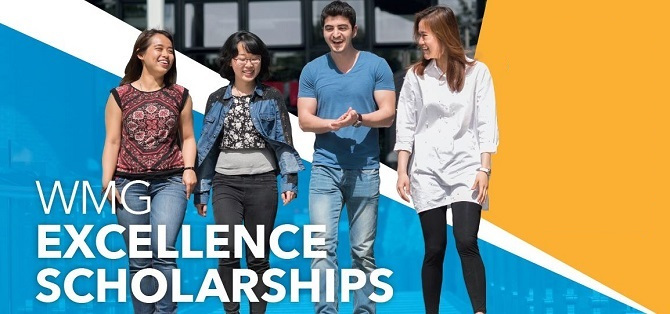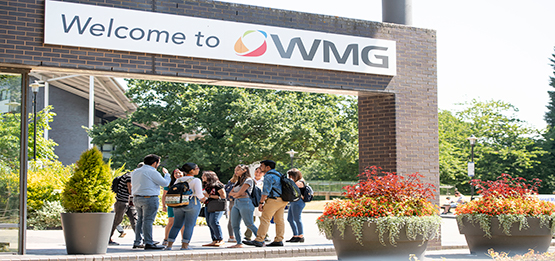e-Business Management (MSc) (2023 Entry)

Explore our e-Business Management taught Master's degree.
Online engagement is a defining feature of today’s business environment. Competence in digital activity is crucial to success, be that business profitability, optimised communication, or data management and analysis. Reflecting this, WMG’s e-Business Management MSc is designed around four specialist routes: Data Science and Digital Operations; e-Commerce and Digital Analytics; Digital Marketing; and Digital Technology Management and Consultancy.
Course overview
This course is now now closed for 2023 entry
This degree will equip you with the techniques to manage the strategic development of e-business based organisations and appropriate e-business technologies. You will develop the skills and knowledge to evaluate, manage, and improve the operational functions of an organisation and to apply the concepts of systems integration to the design and development of products and services through market analysis.
With the exponential growth in e-Business activity worldwide, there is great demand for e-Business professionals who bring particular specialised knowledge and skills. This MSc therefore allows you to select from one of four specialisms, providing you with a deeper understanding of one of the key areas of e-Business deployments and tailoring your modules in line with your future career path.
General entry requirements
Minimum requirements
2:i undergraduate degree (or equivalent) in a range of disciplines relevant to your chosen specialism. These may include IT, media, communications, business, data, science or technology related subjects.
Candidates with a UK 2:ii (or equivalent) may be accepted upon demonstration of relevant professional experience.
English language requirements
You can find out more about our English language requirementsLink opens in a new window. This course requires the following:
- Band A
- IELTS overall score of 6.5, minimum component scores not below 6.0
International qualifications
We welcome applications from students with other internationally recognised qualifications.
For more information, please visit the international entry requirements pageLink opens in a new window.
Additional requirements
Candidates with professional experience should include their CV with their application.
Core modules
The following topics are covered in each e-Business Management specialism:
Data Science and Digital Operations specialism
- e-Business Fundamentals
- Enterprise e-Commerce Solutions
- Innovative Simulation Design and Development
- Big Data Analytics and Optimisation
- Machine Learning and Data Engineering
- Problem Solving with Statistics
- Digital and Data Science Consultancy
- Study, Professional and Analytical Skills
e-Commerce and Digital Analytics specialism
- e-Business Fundamentals
- Enterprise e-Commerce Solutions
- Digital Development with Python
- Digital Entrepreneurship and Financing
- Big Data, Analytics and Optimisation
- Agile Project Management and Consultancy
- Supply Chain Integration
- Study, Professional and Analytical Skills
Digital Marketing specialism
- e-Business Fundamentals
- Digital Marketing Strategy and Management
- e-Customer Relationship Management
- Creating a Digital Brand
- Digital Analytics and Marketing Technology
- Digital Retail Strategy
- Digital Marketing Campaigns
- Study, Professional and Analytical Skills
Digital Technology Management and Consultancy specialism
- e-Business Fundamentals
- Technology Management
- Digital Product Development with Cloud
- Emerging Technologies for Business
- Managing Innovation and Change
- Systems Thinking and Systems Engineering
- Digital Consultancy
- Study, Professional and Analytical Skills
Read the module descriptions for this course on WMG's website.Link opens in a new window
Teaching
This course has two components – a taught component accounting for two-thirds of your time and effort, and a research component each accounting for one-third.
For the taught component, we blend lectures with seminars, syndicate exercises, simulations, and case studies. Many modules are taught in small classes to facilitate and encourage interaction. Others practice large-scale lectures, which are then supported by small class seminar and group activities.
Our module leaders have extensive industry experience. Guest speakers from industry also contribute regularly, bringing real-world insight into your learning experience.
In addition to your taught modules, you will undertake a major project as part of your Masters’ degree. This is nominally 600 hours (60 CATS points) of learning, mainly taking place during the Spring and Summer terms. You will be expected to engage regularly with your Project Supervisor and to provide progress updates and drafts of your work to an agreed schedule.
Class sizes
Overall this course can accommodate up to 200 students, divided into smaller teaching classes for the specialisms.
Typical contact hours
Module delivery patterns vary, but most will be delivered in a short learning block of up to 4 weeks, allowing your focus to be on one module at a time. Each module nominally accounts for 150 hours, which includes scheduled classroom time and online sessions as well as your independent study and assessments.
The Study, Professional and Analytical Skills (SPA) Module also consists of 150 hours of learning and is purposefully designed to meet the complex learning and professional needs of postgraduate students. The module is taught across the year, and is composed of three interlinked yet distinctive learning strands: Study Skills, Professional Skills, and Analytical Skills. SPA is a blended module, which runs asynchronously and synchronously with the student learning journey, providing a programme of carefully designed learning activities, materials, and resources.
Assessment
Modules are predominantly assessed by way of written Post Module Assignments (PMA), but assessment can also be in other formats. Most modules will also have a degree of In-Module Assessment (IMA), which will vary by module and may take the form of presentations, on-line tests, self-reflection or a range of other methods.
For the research component, you will undertake a major research project. Project submission is likely to include both a written and a presentation element, accounting for 33% of your overall academic grade.
Reading lists
Most departments have reading lists available through Warwick Library. If you would like to view reading lists for the current cohort of students you can visit our Warwick Library web pageLink opens in a new window.
Your timetable
Core modules will be allocated to students at the end of the first week of term - you will then be able to view your individual module schedule for the rest of the year via the WMG module selection system.
Elective modules will be bookable through the same system later in the term.
Modules will include scheduled classroom time and online sessions as well as your independent study and assessments, and will usually be delivered within a 4 week timeframe. Occasional classes and study skills sessions may be held at weekends or in the evenings.
As a Masters student, you are expected to manage your own time appropriately. On average, you are expected to commit 38-40 hours of study each week, in order to successfully achieve your Master’s degree.
This is a full-time postgraduate course - undergraduate term dates do not apply. Whilst there are no holidays as such, there will be no teaching scheduled when the University is officially closed, during the two weeks over Christmas and New Year.
Your career
Graduates from Cyber Security in WMG have gone on to work for a variety of employers including:
- Accenture
- PWC
- KPMG
- Deloitte
- IBM
- Ministry of Defence
- HP
- Cisco
- Tata Consulting Services
They have pursued roles such as:
- Cyber Security Consultant
- Information Security Analyst
- Technology Analyst
- IT Security and Governance Officer
- Security Project Manager
- Network Consulting Engineer
- IT Risk and Resilience Manager
- Senior Investigation Officer
Helping you find the right career
Our department has a dedicated professionally qualified Senior Careers Consultant offering impartial advice and guidance together with workshops and events throughout the year. Previous examples of workshops and events include:
- Warwick careers fairs throughout the year
- WMG Future Fest
- Options in Engineering sector event
- Careers for experienced hires
- Careers in Cyber Security
- Careers in healthcare
- Careers in project management
WMG at Warwick
Having forged strong links with global companies through 42 years of collaborative research and development, we really understand the global market you’ll be operating in, and have designed our programmes to match.
Find out more about us on our websiteLink opens in a new window
Our courses
- Cyber Security Engineering (MSc)
- Cyber Security Management (MSc)
- e-Business Management (MSc)
- Engineering Business Leadership (MSc)
- Engineering Business Management (MSc)
- Games Engineering (MSc)
- Healthcare Operational Management (MSc)
- Innovation and Entrepreneurship (MSc)
- Intelligent Manufacturing Systems (MSc)
- International Trade, Strategy and Operations (MSc)
- Programme and Project Management (MSc)
- Smart, Connected and Autonomous Vehicles (MSc)
- Supply Chain and Logistics Management (MSc)
- Supply Chain Leadership (MSc)
- Sustainable Automotive Electrification (MSc)
Our Postgraduate Research degrees
Visiting WMG
There are a number of different ways to visit the University of Warwick throughout the year. We host bespoke PG visits, where you can talk directly with your chosen department and explore our campus through a personalised tour. WMG also organises events for prospective students including a weekly Live Chat so you can connect directly with the department to speak with staff and students from WMG. For more about university wide open days and tours, visit our Postgraduate Visits page.
Scholarships and bursaries

Scholarships and financial support
Find out about the different funding routes available, including; postgraduate loans, scholarships, fee awards and academic department bursaries.

WMG funding opportunities
WMG will be awarding over £1million in scholarships and bursaries to students commencing study on our full-time MSc programmes

Living costs
Find out more about the cost of living as a postgraduate student at University of Warwick.
Additional funding information
We have a number of research projects available which are fully or partially funded. The majority of these are for UK/EU applicants, though occasionally we advertise positions that are also open to overseas applicants. Please refer to specific project descriptions for details. See our Research Degree opportunities here.

Find out how to apply to us, ask your questions, and find out more.

Taught course applications
Here is our checklist on how to apply for taught postgraduate courses at Warwick.

Application advice from WMG
Please see the WMG department web pages for specific application advice and information.

After you’ve applied
Find out how we process your application.

Applicant Portal
Track your application and update your details.

Admissions statement
See Warwick’s postgraduate admissions policy.

Join a live chat
Ask questions and engage with Warwick.
Postgraduate Open Day
Our Postgraduate Virtual Open Day will help you find out more about your course of interest, as well as general topics like applying to Warwick, accommodation, careers and funding.Postgraduate fairs
Throughout the year we attend exhibitions and fairs online and in the UK. These events give you the chance to learn about our Master's and PhD study routes, and the wider context of postgraduate study.
Live chats
Every week, you can connect directly with representatives from Warwick, who will be answering your questions on applying to and studying postgraduate studies at Warwick.
Departmental events
Some academic departments hold events for specific postgraduate programmes, these are fantastic opportunities to learn more about Warwick and your chosen department and course.
Connect with us
Want to hear more about postgraduate study at Warwick? Register your interest and find out more.
